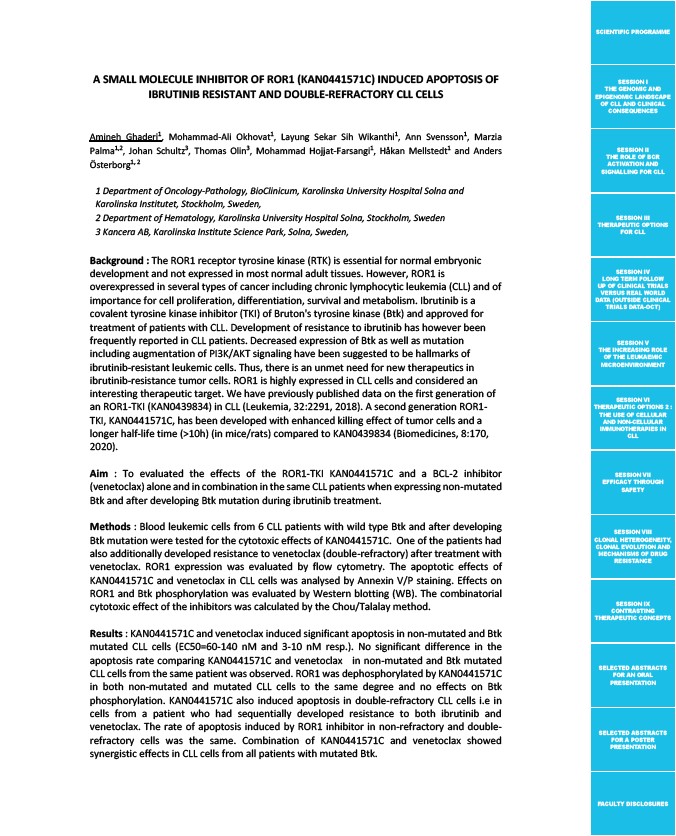
SCIENTIFIC PROGRAMME
SESSION I
THE GENOMIC AND
EPIGENOMIC LANDSCAPE
OF CLL AND CLINICAL
CONSEQUENCES
SESSION II
THE ROLE OF BCR
ACTIVATION AND
SIGNALLING FOR CLL
SESSION III
THERAPEUTIC OPTIONS
FOR CLL
SESSION IV
LONG TERM FOLLOW
UP OF CLINICAL TRIALS
VERSUS REAL WORLD
DATA (OUTSIDE CLINICAL
TRIALS DATA-OCT)
SESSION V
THE INCREASING ROLE
OF THE LEUKAEMIC
MICROENVIRONMENT
SESSION VI
THERAPEUTIC OPTIONS 2 :
THE USE OF CELLULAR
AND NON-CELLULAR
IMMUNOTHERAPIES IN
CLL
SESSION VII
EFFICACY THROUGH
SAFETY
SESSION VIII
CLONAL HETEROGENEITY,
CLONAL EVOLUTION AND
MECHANISMS OF DRUG
RESISTANCE
SESSION IX
CONTRASTING
THERAPEUTIC CONCEPTS
SELECTED ABSTRACTS
FOR AN ORAL
PRESENTATION
SELECTED ABSTRACTS
FOR A POSTER
PRESENTATION
FACULTY DISCLOSURES
A SMALL MOLECULE INHIBITOR OF ROR1 (KAN0441571C) INDUCED APOPTOSIS OF
IBRUTINIB RESISTANT AND DOUBLE-REFRACTORY CLL CELLS
Amineh Ghaderi1, Mohammad-Ali Okhovat1, Layung Sekar Sih Wikanthi1, Ann Svensson1, Marzia
Palma1,2, Johan Schultz3, Thomas Olin3, Mohammad Hojjat-Farsangi1, Håkan Mellstedt1 and Anders
Österborg1, 2
1 Department of Oncology-Pathology, BioClinicum, Karolinska University Hospital Solna and
Karolinska Institutet, Stockholm, Sweden,
2 Department of Hematology, Karolinska University Hospital Solna, Stockholm, Sweden
3 Kancera AB, Karolinska Institute Science Park, Solna, Sweden,
Background : The ROR1 receptor tyrosine kinase (RTK) is essential for normal embryonic
development and not expressed in most normal adult tissues. However, ROR1 is
overexpressed in several types of cancer including chronic lymphocytic leukemia (CLL) and of
importance for cell proliferation, differentiation, survival and metabolism. Ibrutinib is a
covalent tyrosine kinase inhibitor (TKI) of Bruton's tyrosine kinase (Btk) and approved for
treatment of patients with CLL. Development of resistance to ibrutinib has however been
frequently reported in CLL patients. Decreased expression of Btk as well as mutation
including augmentation of PI3K/AKT signaling have been suggested to be hallmarks of
ibrutinib-resistant leukemic cells. Thus, there is an unmet need for new therapeutics in
ibrutinib-resistance tumor cells. ROR1 is highly expressed in CLL cells and considered an
interesting therapeutic target. We have previously published data on the first generation of
an ROR1-TKI (KAN0439834) in CLL (Leukemia, 32:2291, 2018). A second generation ROR1-
TKI, KAN0441571C, has been developed with enhanced killing effect of tumor cells and a
longer half-life time (>10h) (in mice/rats) compared to KAN0439834 (Biomedicines, 8:170,
2020).
Aim : To evaluated the effects of the ROR1-TKI KAN0441571C and a BCL-2 inhibitor
(venetoclax) alone and in combination in the same CLL patients when expressing non-mutated
Btk and after developing Btk mutation during ibrutinib treatment.
Methods : Blood leukemic cells from 6 CLL patients with wild type Btk and after developing
Btk mutation were tested for the cytotoxic effects of KAN0441571C. One of the patients had
also additionally developed resistance to venetoclax (double-refractory) after treatment with
venetoclax. ROR1 expression was evaluated by flow cytometry. The apoptotic effects of
KAN0441571C and venetoclax in CLL cells was analysed by Annexin V/P staining. Effects on
ROR1 and Btk phosphorylation was evaluated by Western blotting (WB). The combinatorial
cytotoxic effect of the inhibitors was calculated by the Chou/Talalay method.
Results : KAN0441571C and venetoclax induced significant apoptosis in non-mutated and Btk
mutated CLL cells (EC50=60-140 nM and 3-10 nM resp.). No significant difference in the
apoptosis rate comparing KAN0441571C and venetoclax in non-mutated and Btk mutated
CLL cells from the same patient was observed. ROR1 was dephosphorylated by KAN0441571C
in both non-mutated and mutated CLL cells to the same degree and no effects on Btk
phosphorylation. KAN0441571C also induced apoptosis in double-refractory CLL cells i.e in
cells from a patient who had sequentially developed resistance to both ibrutinib and
venetoclax. The rate of apoptosis induced by ROR1 inhibitor in non-refractory and double-refractory
cells was the same. Combination of KAN0441571C and venetoclax showed
synergistic effects in CLL cells from all patients with mutated Btk.